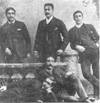Preparations
'Joe' Warbrick was the captain and one of the organisers of the Native touring team. The other was Thomas Eyton, who had served in the Armed Constabulary before joining the civil service. While visiting Britain for Queen Victoria's Golden Jubilee in 1887 he had attended a number of rugby matches and noted that 'the play I saw was not vastly superior to that I had seen in New Zealand'. In the absence of any body regulating the game in New Zealand (the New Zealand Rugby Football Union was not formed until 1892), Eyton was free to promote a tour of Britain as a private venture.
As Greg Ryan has argued, in doing so Eyton sought to exploit the British fascination with indigenous visitors from the Empire, and especially sportspeople. His precedent was the tour by an Aboriginal cricket team from western Victoria which played 47 matches in Britain in 1868. Profits had been made from this 'impossible coffee-coloured team'; Eyton envisaged more profits from a team 'presenting the appearance and character of true Maori' which would reaffirm belief in imperial ideology by the very act of competing against representatives of the imperial power on an apparently level playing field. As The Times was to editorialise soon after the Natives arrived, 'the colonising race that can imbue the aboriginal inhabitants of the colonised countries with a love for its national games, would seem to have solved the problem of social amalgamation in those countries'.
In autumn 1888, Warbrick scoured New Zealand for talented Maori rugby players willing to commit themselves to more than a year of travel. He selected three of his own brothers, including the Rotorua tourist guide Alfred Warbrick. The tour's financial success would depend on putting together a team strong enough to win most of its matches. In rugby � unlike cricket � this required at the very minimum a first fifteen of competent players.
Of the 21 Maori who eventually
toured, only a third had represented their provinces, and five Pakeha players
were added to strengthen the team. The average age of the tourists was
only 22 or 23. Nearly all were single and had poor job prospects. An expenses-paid
trip to Britain must have appealed.
The Natives' fixture list included a team photo and information about
the players.
Museum
of Rugby, Twickenham.
